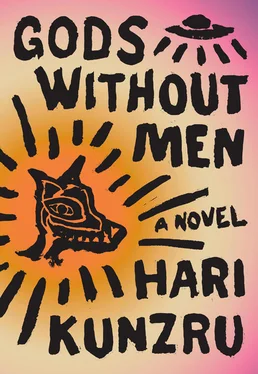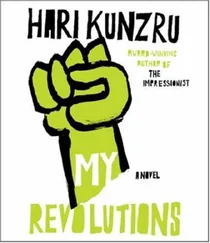Uncle Hafiz was sitting at one of the Formica tables, smoking and talking to his friends, the deputy mayor, the chief of police and the imam. They were already behaving like important men, puffing themselves up, taking their space. The chief of police was a limo driver. The imam had a beauty salon in Ventura. Uncle waved to her but didn’t invite her to sit with him. Decorum had to be observed. She took a tray and ate alone, trying not to make eye contact with the people at the other tables. Again, she wondered whether she should find the person in charge and say she wanted to go home.
After breakfast it was time for a briefing. All the Iraqis crammed into the main hall, where a petite civilian called Heather introduced herself as the simulation coordinator for Echo Sector and gave a PowerPoint presentation. She wore sweats, a high ponytail and a baseball cap, and carried her phone on a lanyard round her neck; her high-school sportscoach look was completed by a pair of silver running shoes. She was accompanied by REDFOR Control, a grumpy-looking uniformed officer called Lieutenant Alvarado. Heather was fizzing with excitement. Alvarado looked like he’d rather be cleaning the toilet block. Heather more than made up for the lieutenant’s lack of enthusiasm, announcing in a helium voice that she was “stoked to be part of Operation Purple Rose.” She wanted all the “noncombatant role-players” (which was them) to know that they were “playing a critical role in the nation’s security.” She hoped they would all “give a hundred and ten percent at all times.” Laila sat there, trying to project the evil eye in a beam aimed at Heather’s forehead.
The job of the villagers of Wadi al-Hamam was to help American troops understand what it would be like when they deployed to Iraq. They’d do this by playing realistic roles, some pro-American, some hostile. They’d each been assigned an individualized character with a name, biography and backstory. Heather said she wanted them to think about how their characters would react in various situations, so they could be as truthful as possible when interacting with the soldiers. This was, she said, a “fine-grained simulation.” They should all consider themselves “tiny moving parts, like cogs in a watch.”
Laila wasn’t sure she wanted to be a tiny moving part, unless it was lodged in Heather’s windpipe. She was even less sure when she opened the envelope containing her character details. She was a country girl called Rafah, who’d lived in Wadi al-Hamam all her life, but wanted to train as a nurse. She hated the Americans because her father had been killed in a checkpoint shooting. In the game she would be sympathetic to the insurgents and help them whenever she could. As she read the paper, her hands shook. Why had they given her a dead father? Had Hafiz told them about Baba? She went to Heather and asked to be given a different biography. Heather looked at her strangely. “It’s only for the simulation, honey. It’s to help you play your part. Look at the alignment graph — you’ll see you have a strongly negative attitude to the U.S. as a liberating force. Just go with that.”
“But I don’t want to be this Rafah.”
“It’s not something we can change at this stage.”
“Why not?”
“I’m sorry, but I can’t have this discussion with you. We need you in this role. You’ll just have to live with it. And, while we’re talking, if I could make a suggestion, I think it’d be best if you didn’t wear so much eye makeup. We like our civilian role-players as far as possible to adopt an ethnically traditional look. You brought your veil with you, right?”
“My veil?”
“Your, uh, head covering and your robes and whatnot?”
Laila replaced her earbuds and walked away. Go on, she thought. Fire me, bitch. See if I care. Uncle Hafiz came over and tried to speak to her. She watched his mouth move for a while, soundtracked by Arcade Fire. Eventually he threw up his hands and waddled off, presumably to do something important and administrative, such as rearranging his mayoral props on their shelves inside his shipping container. She spent the rest of the day hiding from everyone, reading a Neil Gaiman book in the shade cast by the minaret of the fake mosque.
That evening the villagers hung out in the hall and watched TV. On the news was a story about Nicky Capaldi. They showed pictures of him coming out of a police station and getting into a big black Suburban; he was wearing dark glasses and looking annoyed. She couldn’t believe it: Apparently he’d been questioned about the disappearance of a child. They showed some concert footage and a few shots of him at an awards show, then cut to a photograph of the missing boy. Laila was shocked. Obviously Nicky had nothing to do with it. His management had released a statement calling on the abductor to bring the kid back, and a disappointed-looking sheriff came on, saying they’d eliminated him as a suspect. There was even a shot of the main street near her house, which was full of news vans and photographers. She wondered if Samir had been there.
Still thinking about Nicky, she went to the dormitory and wired up her record player. Ignoring the strange looks she got from the other women lounging around reading and writing letters, she plugged in a pair of big padded headphones and lay down on her cot to listen to the first side of the Ashtar Galactic Command record.
It was like no other music in her collection. It started with a quivery electronic drone, the kind of noise made by the equipment you saw in old science-fiction movies, with big metal dials and wavy lines going up and down on little screens. It was joined by a scraping of guitar strings and primitive drumming that sounded like it had been recorded inside a shoebox, a relentless dull thud that went on and on without changing at all. Sometimes there were other noises, bangs and clankings, little bursts of feedback or sounds like stringed instruments being dropped on a hard floor. Very low down in the mix, almost at the edge of hearing, there were voices whispering half-intelligible words: We speak in the names of all sentient beings in the thirty-three sectors of the Universe, in the name of the Ascended Masters and the Conclave of Interdimensional Unity.… The effect was scary and boring at the same time, like a crazy person sitting next to you on the bus. The first time she played it, she thought it was the worst music she’d ever heard. That was probably why she put it on the deck again. Surely nothing could be that bad. Why would anyone make music that sounded so … unmusical? No one would buy it. Probably no one ever did. The Ashtar Galactic Command wasn’t exactly a household name.
Listen. We repeat, listen …
So she’d listened. She had nothing better to do. On the second, third, fourth plays, she started to hear weird things — chanting, crying and screaming, people gurgling as if they were being strangled. The record seemed to be some kind of jam session, just a bunch of musicians playing and letting a tape run. And while they played, something truly strange had been going on in the room, a party, maybe. Something. Often the background noise was obscured by more musical sounds, electronic runs and trills that seemed to have been played by someone following the beat of a completely different drummer from the one banging away on the record, as if the players could hear something she couldn’t, something significant that she really wanted to hear, that she needed to hear, if only to satisfy her curiosity.
Lying in the dormitory, she shut her eyes and listened to a passage that was now as familiar to her as Nicky Capaldi’s first album. The pulse of the drums was joined by a high-pitched whistling and a sinister rumble that rose up and up until it sounded like a rocket taking off. Out of the rumble came a bass, which was doubled by a guitar and some other instrument that might have been a keyboard. Cocooned inside her headphones, her eyes tight shut, she felt as if she were inside a capsule, heading out into space.
Читать дальше












